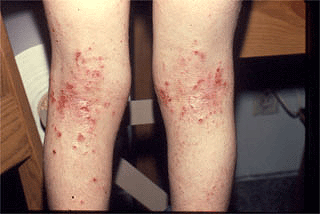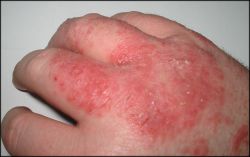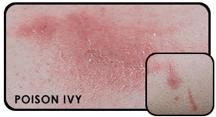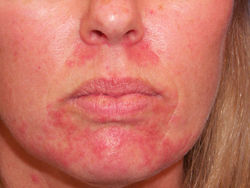




RASHES
 |
 |
 |
 |
 |
Question: What is red and itchy, but can also be bumpy, lumpy, or scaly?
Answer: If you said a rash, you're right!
Types of Rashes
A rash can also be called dermatitis, which is any swelling (puffiness) or irritation of the skin. It can be red, dry, scaly, and itchy. Rashes also can include lumps, bumps, blisters, and even pimples. Most people have had a rash or two. When you were a baby, you probably had diaper rash!
But some rashes, especially combined with a fever, can be signs of serious illnesses. Hives, also called urticaria (Pronounced: ur-tuh-kar-ee-ah), also can be serious because they can be a sign of an allergic reaction and the person may need immediate medical attention.
Hives, which are reddish or pale swellings, appear on a person's body when a chemical called histamine is released in response to an allergen. The trigger could be a certain food, medicine, or insect bite. A virus also can cause hives.
Here are some other common types of rashes:
What to Do If You Get a Rash
Some rashes form right away and others can take several days to occur. When a rash appears, you usually know it because it will start to bother you. If you develop a rash, tell a parent or another adult as soon as you can. For instance, you might want to see the school nurse if you are at school.
Try not to scratch. If you do, the rash may take longer to heal and you'll be more likely to develop an infection or scar.
A visit to the doctor is a good idea if you have a rash. Although all rashes may look alike to you, a skin doctor called a dermatologist knows the difference. And knowing which kind of rash you have can help the dermatologist choose the best treatment to heal your rash.
For eczema, the doctor may suggest special moisturizers called emollients. Emollients retain the water in your skin, keeping it soft and smooth while soothing the itchy feeling.
With poison ivy, the doctor may prescribe cool showers and calamine lotion. In more severe cases, a liquid or pill medicine called an antihistamine may be needed. It decreases itching and redness.
For rashes that are caused by an allergen, including hives, the doctor will probably want more information. He or she will want to find out which food, substance, medicine, or insect caused your rash or hives. He or she may recommend a medical test to determine which allergens are causing you trouble. It's important to find this out because the best way to prevent rashes and hives caused by allergens is to avoid the problem food, substance, medicine, or insect.
Rash Prevention
Prevention is also the name of the game when it comes to other kinds of rashes.
Being a kid means getting a few rashes. But now you know what to do if you get that awful itchy feeling!
Disclaimer: This information is not intended be a substitute for professional medical advice. It is provided for educational purposes only. You assume full responsibility for how you choose to use this information.
Updated and reviewed by: Eliot N. Mostow, MD, MPH
Date reviewed: May 2004
Originally reviewed by: Patrice Hyde, MD